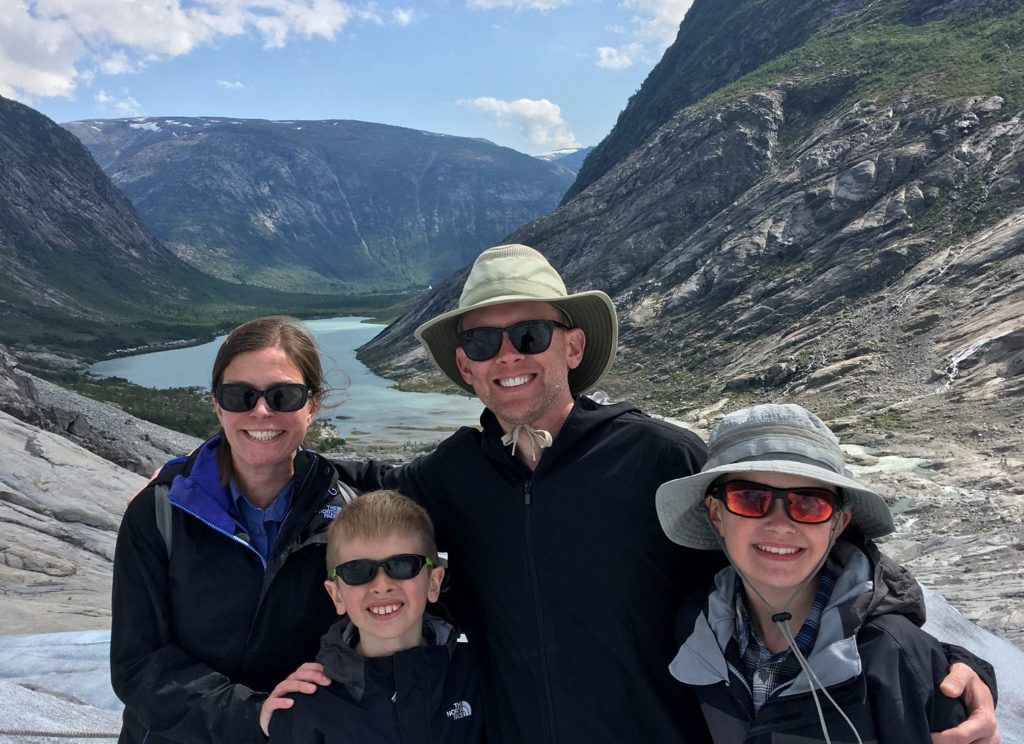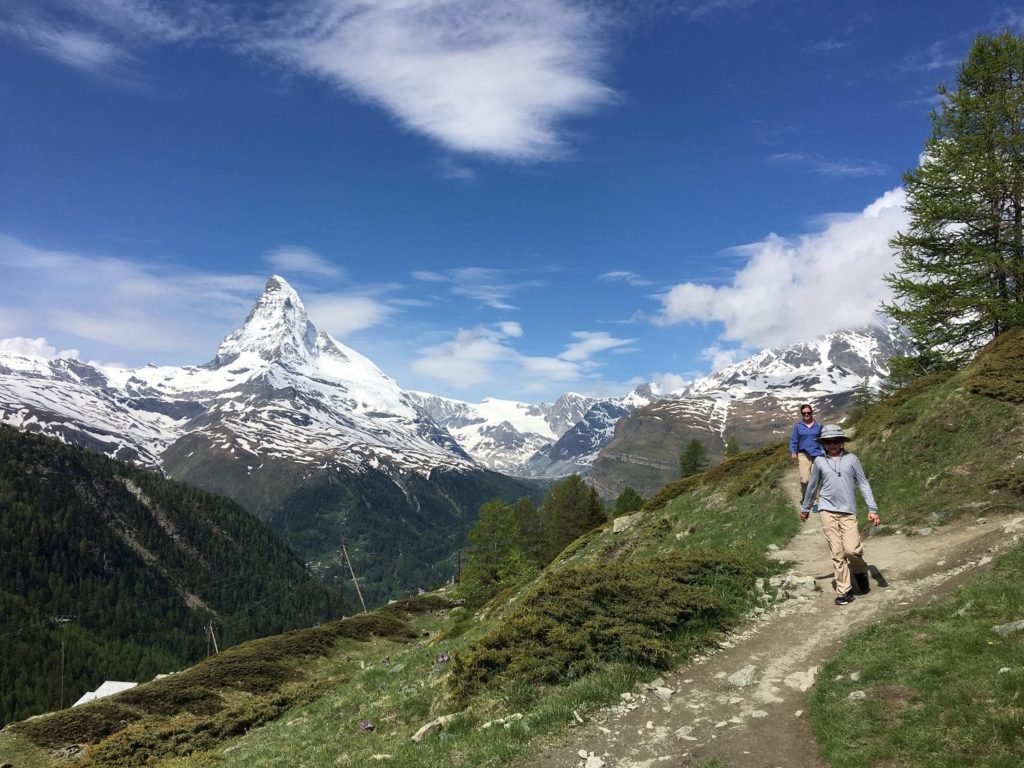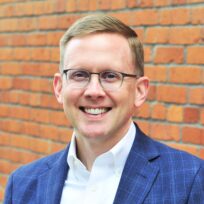Why Three Months in Europe Made Me a Better Advisor
And Other Lessons Learned Along the Way
Standing in awe, we looked out over the glacier-carved valley below us. Our crampons were firmly affixed and their spikes had found secure purchase in the ice. The glacier we stood atop towered eight stories above the rocky valley below, and shimmering glacial rivers streamed out in all directions, carrying chunks of ancient ice along with them. The sky was blue, the air was crisp, and best of all, I was experiencing this moment with my family; wife Christine, and sons, Adam and Andrew.
This extraordinary moment in a remote part of Norway was just one of hundreds that my family experienced during our three-month adventure throughout Europe. How, might you ask, does someone in the middle of their career get to leave their job for over 90 days and travel the world? I am fortunate to call Brighton Jones my career home, where after ten years of employment, we are given a fully paid three-month sabbatical (we call it our YOLO – You Only Live Once). It was truly a trip of a lifetime.
How, might you ask, does someone in the middle of their career get to leave their job for over 90 days and travel the world?
After returning to the office and resuming normal life, I began to reflect on everything we witnessed and observed—world history, politics (past and present), micro and macroeconomics, the rise and fall of civilizations, geological time vs. human time—it was more than I could possibly process at the time, and I will no doubt continue processing the experience for the rest of my life.
As part of this reflection, I realized that many of the observations we made and lessons we learned on our trip are directly applicable to my role as financial advisor and counselor to individuals and families. And although the following observations are just a sampling, it allows me to begin articulating my experiences and sharing them with others.
We’re Just Like Everyone Else
As we prepared for our trip, my family wondered how we, as Americans, would be treated by Europeans. And my boys wondered if Europeans would be different than we are. Would the Greeks be as friendly as our guidebook suggested? Would the Parisians be rude? Would the Swiss be distant and aloof? Would the English be snobby and condescending? How would the language barrier affect our travels?
As our trip was coming to a close, we asked our boys what they had learned on our trip. One of the first things they said was “Everyone is the same.” It didn’t matter whether we spoke the same language (some of our most memorable moments were when we struggled to communicate with others), and it didn’t matter whether we were in Italy or Germany, Denmark or Norway. People are people with the same basic wants and needs.
Of course, there are cultural differences, and we certainly ran into people who could have lived without another tourist occupying their space. But ultimately, a smile or small act of kindness was gladly repaid. The golden rule worked just as effectively in Paris as it did in Stockholm or Munich. We went from being anxious about living within foreign cultures for three months to realizing that cultural differences are on the margins. As Maya Angelou so wisely stated, “We are more alike, my friends, than we are unalike.”
As I think about this lesson as it relates to investing one’s capital, it reminds me to fight the innate desire for “home bias.” We want to invest in what we know and feel comfortable with, and it’s often more comfortable to invest in companies that operate in our backyard than across the Atlantic or Pacific. But if you believe that we are indeed more alike than we are unalike, and we’re all seeking growth and success in our business endeavors, it should only be natural to invest in the companies that reside outside our borders in addition to the businesses at home.
Maybe it Isn’t Different This Time
Europe gave us an upfront look at civilizations and movements that have come and gone with the passage of time—3,500-year-old Mycenaean ruins in Greece, the Parthenon in Athens, the Colosseum in Rome, ships from the Viking age, and fast forward to the horrors of Nazi-era Germany and the rise (and fall) of fascism. Humans have created, destroyed, fought, and endured over millennia.
Humans have adapted and endured and continued the march of progress, even against what may seem to be insurmountably high obstacles.
In my nearly two decades as an advisor, the power of fear has reared its ugly head on many occasions. Whether it was the tech bubble bursting, the terrorist attacks of 9/11, the global credit crises of 2008, or uncertainty created by elections (either domestically or abroad), there has always been a reason to be fearful and think it must be different this time. But when we take a step back and reflect on the arc of human history, we quickly realize that what may feel like a new risk is actually just an old risk with a different headline.
The enduring value of travel is that it allows you to witness history’s sweeping impact over hundreds of generations instead of only one, reminding us that we have adapted and endured and continued the march of progress, even against what may seem to be insurmountably high obstacles.
Time on a Grander Scale
I’m a sucker for spectacular mountains, and the Matterhorn in Switzerland had always been on my bucket list. Its iconic shape and the way it stands alone among smaller nearby mountains make it truly unique.
What I didn’t know, however, is that the base of the Matterhorn contains rocks that were formed under the Tethys Sea (an ancient ocean that once separated Africa from Europe), the center of the mountain contains rocks from the Eurasian plate, and the top is comprised of rocks from the African plate which were thrust on top of the Eurasian plate when they collided some 30 million years ago.
Reflecting on the history of civilizations, politics, and economies provides us with great perspective on the human experience over time, but sometimes I seek an even deeper perspective—one that recognizes an entire civilization from rise to fall as a mere blink of an eye in the depth of geologic time. Discovering the story of the Matterhorn and the many other natural wonders we encountered on our trip helped us to see time on a much grander scale.
We are ultimately just momentary visitors against the backdrop of time immemorial and should endeavor to adjust our perspectives accordingly.
As an advisor, I often work with clients during some of life’s most difficult and trying moments (job loss, divorce, illness, and death). But I also get to share in life’s many joys and celebrations (marriage, promotions, and the birth of kids and grandkids). We refer to this as the intersection between life and wealth, and we stand right at the crossroads.
To remain grounded and steady in the advice we give during these trials and triumphs, I will look to the perspective granted to me when gazing upon those iconic mountain peaks, towering fjords carved by glaciers, or ancient lava flows created by violent volcanic eruptions. We are ultimately just momentary visitors against the backdrop of time immemorial and should endeavor to adjust our perspectives accordingly.
What Matters Most
As the oft-repeated quote reminds us, the best things in life aren’t things. But not until this trip did the full meaning of this truism become clear to me. We left our home in Seattle with a backpack on each of our backs, and nothing else. The kids left their roomful of Legos, Nerf guns, and other toys. We all wore the same three travel-friendly shirts. The creature comforts and material possessions we normally enjoyed were left at home to collect dust. And yet we had never been happier. We realized in clearer terms than ever before that the stuff in our lives doesn’t drive happiness. If anything, it can stifle happiness.
I believe that securing one’s financial freedom and independence is foundational to a better life—one that provides more flexibility and choice. But ultimately, the clients I work with who are happiest and most content are those who embrace this notion of experiences over things, and relationships over possessions.
Albert Einstein said, “The only source of knowledge is experience.” After three months abroad and experiencing this trip of a lifetime with my family, I can state unequivocally that Mr. Einstein was correct.
This post was originally published on LinkedIn.
Read more from our blog:




